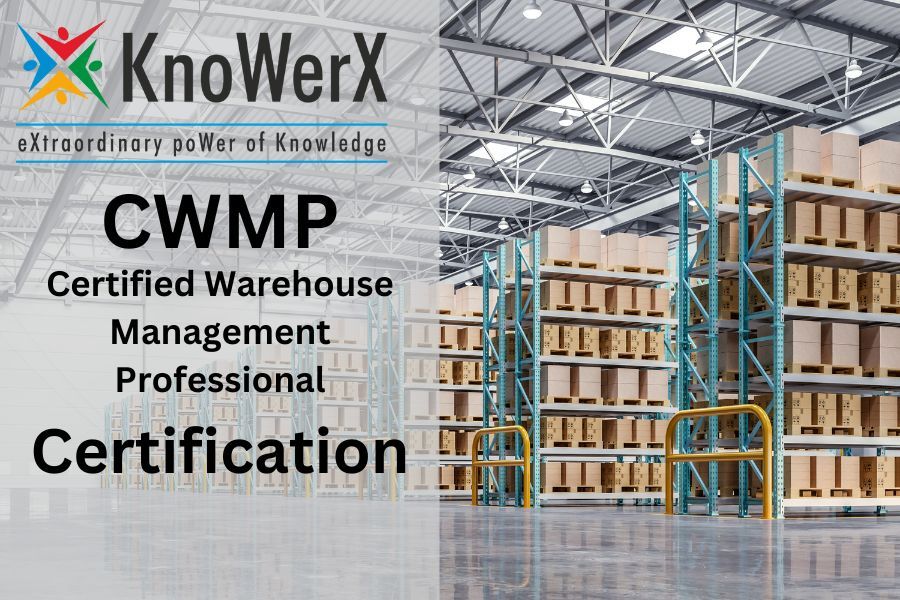Certified Warehouse management professional (CWMP)

CWMP (Certified Warehouse Management Professional) Certification: A Pathway to Success in Warehouse Management In the world of logistics and supply chain operations, managing warehouses is crucial. Warehouses are dynamic places where efficiency is key, and it takes skilled professionals to keep things running smoothly. At KnoWerX, we understand just how important warehouse management is for keeping everything in order. That’s why we’ve created the Certified Warehouse Management Professional (CWMP) program. Let’s talk about what CWMP is all about and why it matters so much in our industry What is a Certified Warehouse Management Professional (CWMP)? The Certified Warehouse Management Professional (CWMP) program by KnoWerX equips individuals with vital skills and knowledge crucial for excelling in warehouse management roles. Covering a broad spectrum of topics such as inventory control, order fulfillment, warehouse layout optimization, transportation management, and risk mitigation strategies, our certification program ensures comprehensive preparation for effective warehouse operations. To get certified, you usually go through training or study materials that cover everything from how to keep track of inventory to organizing the layout of a warehouse efficiently. After that, you have to pass a tough exam given by official certifying bodies. Now, why bother getting CWMP certified? Well, here are some good reasons: Better Job Opportunities: Having CWMP certification opens up more doors for jobs in warehouse management. Employers often prefer hiring people who have proven they know what they’re doing. More Credibility: When you’re CWMP certified, it’s like having a stamp of approval on your resume. It shows that you’re serious about your job and that you’ve put in the effort to learn the ins and outs of warehouse management. Improved Performance: The skills and knowledge you gain from CWMP training help you do your job better. That means you’re more efficient, productive, and better at keeping customers happy. Networking: Being part of the CWMP community means you get to connect with other professionals in the field. This can lead to valuable collaborations, sharing of ideas, and even new career opportunities. Higher Salary Potential: With CWMP certification, you might find yourself earning more than those without it. Companies are willing to pay more for professionals who bring certified expertise to the table. So, if you’re working in warehouse management or aiming to get into the field, getting Certified Warehouse Management Professional (CWMP) certified could be a smart move for your career. How To Learn Warehouse Management System? Traditional Training Programs: These are like the classic classroom-style teachings you might be familiar with. Places like vocational schools or community colleges offer comprehensive courses covering everything from basic principles to advanced technologies. You’ll learn about managing inventory, keeping things safe in the warehouse, and how to operate equipment. Plus, some programs even give you hands-on practice in simulated warehouse setups, which is super helpful. Online Courses and Certifications: If you prefer learning at your own pace or from the comfort of your home, online courses are fantastic. Websites like Coursera, Udemy, and LinkedIn Learning have loads of options, from beginner stuff to more advanced topics. And if you’re looking for something more official, there are certifications like the Certified Warehouse Management Professional (CWMP) from KnoWerX institution. These certifications show you’re skilled in things like controlling inventory and running warehouse operations smoothly. Get Real-world Experience: Sometimes, nothing beats rolling up your sleeves and getting hands-on. Internships or entry-level jobs in warehouses can give you that practical knowledge you can’t get from books alone. You’ll see how things really work, get comfortable with the software and tech used in the industry, and pick up important skills like problem-solving and communication. Some companies even have special training programs or mentors to help you climb the ladder in warehouse management. What Is The Scope Of Warehouse Management? Warehouse management is super important in the big picture of how stuff gets from point A to point B in the business world. It’s like the backstage crew of a theater production – they make sure everything runs smoothly so the show can go on. Here’s what you need to know: Warehouse Management’s Role in the Supply Chain: Imagine a huge puzzle where each piece represents a step in getting products to customers. Warehouse management is one of those crucial puzzle pieces. It’s all about making sure things get to the right place at the right time. Warehouse managers keep an eye on what’s in stock, figure out the best way to store things, and work with other teams like shipping and manufacturing to make sure everything flows smoothly. Career Opportunities in Warehouse Management: If you’re thinking about diving into warehouse management, there’s a whole bunch of paths you can take. You might start out doing basic tasks like organizing inventory or moving stuff around. As you get more experience, you can climb the ladder to jobs like managing a whole warehouse or even overseeing the whole operation. There are also specialized roles if you’re really into stuff like tracking inventory or planning logistics. Demand for Warehouse Managers: Think of it like this – as more and more businesses grow and sell stuff online, they need individuals who can keep their warehouses running like well-oiled machines. That means there’s a growing demand for people who know their way around warehouse management. Whether it’s retail, manufacturing, or shipping, there are plenty of places looking for skilled warehouse managers. What Qualifications Do I Need To Be A Warehouse Manager? Educational Requirements: While formal education requirements may vary depending on the employer and specific job roles, a bachelor’s degree in logistics, supply chain management, business administration, or a related field is often preferred. Employers also consider candidates with relevant associate degrees or Certifications in warehouse management. Skills and Abilities: Leadership: You’ll need to lead and motivate teams, delegate tasks, and create a positive work environment. Organization: Being able to arrange the layout of the warehouse, manage inventory systems, and streamline workflow is crucial. Analysis: Understanding data and trends helps in making decisions to improve warehouse operations. Communication: You’ll
